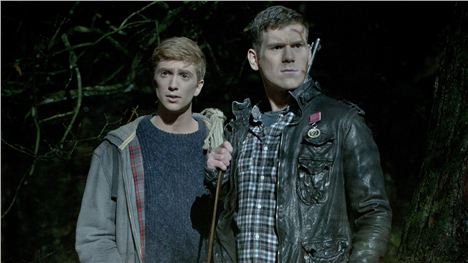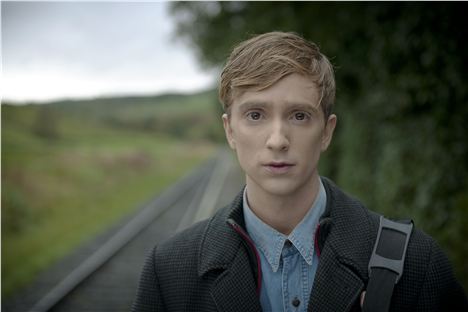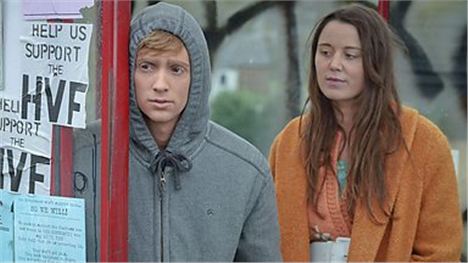IT looks like a typical GP surgery in a parochial Lancastrian village. The only difference is the hulking great big zombie being led around on a chain. “F**k!” exclaims out-of-breath actor Kevin Sutton, who plays Gary Kendal, a one-time vigilante squad member responsible for rounding up the errant member of the undead, “He’s a big bloke. I need a cigarette.”
The director, Jim O'Hanlon, is yelling out instructions, “Can you look a bit more like you’re going to eat him?”
In The Flesh has always been slyly subversive and quietly political, but this series feels even more timely
It’s October 2013, and we’re on the set of acclaimed returning BBC3 drama In The Flesh. Before it debuted as a three-part pilot last year, many people assumed it would be a straight up zombie thriller. But despite being a BBC Salford production, it was more than merely The Walkden Dead.
Instead of focusing on the end of the days itself, it concerned the aftermath of a zombie uprising where, rehabilitated and medicated, one former rabid zombie, teenager Kieren Walker (played by Bafta-nominated Luke Newberry) was being returned to both the family who lost him to suicide, and the curtain-twitching community he once devastated in his feral state. Armed with cover-up mousse and contact lenses to disguise his decay, the politically-correct term for him is that he’s PDS – a “Partially Deceased Syndrome” sufferer.
By setting the action in Roarton, a village in northern England, the action unfurled like a kitchen-sink drama; the colour palette remained grey and muted, like the visual equivalent of a Smiths song. It was a multi-layered, emotionally-charged parable about prejudice, fear of the ‘outsider’, and the effect of grief; owing more to Channel 4’s Boy A than Tinsel Town’s World War Z.
In The Flesh
“People tell me they cried at it all the time,” says Dominic Mitchell, who won the Bafta Craft Award last month for best drama writer. “Because we’re doing a zombie show, people wonder why they’re so emotionally involved. In the 70s, zombies were looked upon as serious. George A Romero was doing all this social commentary through his films, but as the 80s progressed, there was more of a comedic feel about zombies, so people saw them as figures of fun. We’ve come full-circle with In The Flesh. The pitch was always: “What if Ken Loach wrote a zombie show?”
In his trailer, 23-year-old lead actor Luke Newberry reflects on how the show went from a modest beginning to a word-of-mouth success. “I was at a music festival in France and people kept on coming up to me and shouting (he adopts an ‘Allo ‘Allo! accent) “Le Zombie!”. It’s doing really well in America and they love it in Australia. I’ve had fan letters from China. I always wonder how they get the whole ‘northern’ thing in these places.”
It's difficult being the odd one out
While series one confined itself to Kieren’s immediate family and community, the six-part second season deals with the national political unrest and the dichotomy of extremes between the Undead Liberation Army (ULA), a fanatical faction of PDS sufferers responsible for a spate of ‘terrorist’ attacks (achieving martyrdom by swallowing ‘blue oblivion’, a drug that reverts them to a rabid state) and Victus, a right-wing “pro-life” party that is a bit UKIP.
New character, MP Maxine Martin (Wunmi Mosaku) comes across as a kind of Nigella Farage. In the same way that PDS sufferers cover their true selves with make-up and mousse to make themselves more palatable to society, she seemingly dons a mask of cordial concern to conceal her true bigotry.
“Victus is based on a single-issue party – it would be unfair on UKIP to say that’s the direct influence,” says Mitchell. “Victus is a political party which has one issue at its core – the kind that tend to flourish during times of fear and unrest.”
“Our aim for In The Flesh was always: what would genuinely happen if a zombie apocalypse occurred? Moving forward with series two, I thought there would be a backlash to the government’s liberal policy of putting them back in the community.”
“There would be a feeling from the living that my rights aren’t being looked after; I’m being forced to live next door to a killer.”
“This isn’t a cartoony show. There are no moustache-twirling villains. Victus have a point. Their whole mantra is ‘they’re one missed dose away from tearing your head apart’.”
In The Flesh has always been slyly subversive and quietly political, but this series feels even more timely, thanks to Victus’s ‘Give Back’ scheme – that can be interpreted as an allegory for the coalition’s ‘Help to Work’ policy - forcing the undead into unpaid labour in order to re-qualify for citizenship and pay their debt to society.
It’s the minute attention to detail and black streak of Paul Abbott-style humour that anchors the fantastical premise, and makes the horror even more shocking. A northern matriarchal zombie interrupts her beleaguered daughter-in-law’s favourite TV show by complaining sourly: “I didn’t rise out of my grave to watch rubbish like this,” while the nuanced writing swerves past clichés.
“It’s beautifully written,” agrees Newberry, who has worked on films with Helena Bonham Carter and Dustin Hoffman, and is set to appear in the Hollywood movie The Legend of Hercules later this year. “In the first year, we did a gay love story where the word ‘gay’ was never used. It wasn’t in your face or explicit. It was just about people having a connection. And there’s a heartbreaking almost throwaway moment in the first episode where Kieren puts a towel over his mirror before removing his mousse; which is subtle but devastating.”
Ironic poster bus stop
In The Flesh acts as a riposte to those who write BBC3 off as some kind of cultural banana-skin to be avoided on the way to “something Scandinavian with subtitles” on BBC4. It’s not Sun, Sex and Suspicious Zombies. The future of the show is uncertain, as the channel becomes online-only in autumn 2015, but Mitchell has planned five season’s worth of material in a show bible, should it be commissioned again.
“If BBC3 keeps doing what it does – it makes fantastic drama, great comedy and fascinating documentaries – online, that’s fine,” he reasons. “Most of us watch TV through iPlayer now. There’s pros and cons – you kind of want people watching it on a big HD TV and that collective feeling that millions of people are watching it across the country at the same time. It’s harder to have that water-cooler moment, talking about your favourite shows. I’ve been watching True Detective on Netflix, and you say ‘Have you watched this episode?’ and people would recoil, ‘Don’t talk to me about it, I haven’t caught up, no spoilers.’”
“But then BBC3 is a youth-orientated channel, so I think the move online will be easier for the viewers.”
In The Flesh airs Sundays, 10pm. Each episode will be available on iPlayer shortly after.
You can follow Gary Ryan on Twitter here.















